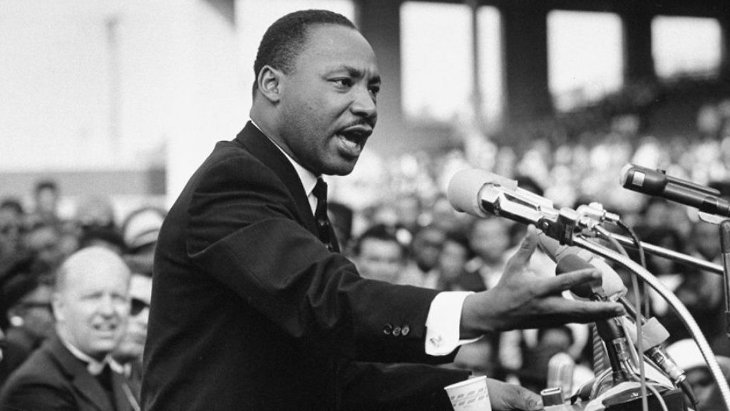 Iran’s Attack on Israel
Iran’s Attack on Israel


5 min read
Inspired by Jewish prophets like Moses, Isaiah and Amos, MLK evoked their message of hope and justice.
The first time I went to Georgia was more than 20 years ago while I was dating my future wife. She suggested we visit Stone Mountain Park near her childhood home outside Atlanta. The name of the site was vaguely familiar.
As we climbed up the bare rock, I suddenly remembered where I recognized it: Stone Mountain was one of the heights Dr. Martin Luther King Jr. referenced in his “I Have A Dream” speech. On that August day in 1963, King declared before 250,000 people, “Let freedom ring from Stone Mountain in Georgia!”
Today, the site lies at the center of a national debate about the validity of Confederate monuments. The landmark features an enormous sculpture of three Confederate leaders: Robert E Lee, Thomas “Stonewall” Jackson and Jefferson Davis. The Ku Klux Klan held annual gatherings there for 50 years, complete with cross burnings, which continued in King’s time.
King summoned that site and many other heights in his iconic speech. From the snow-capped Rockies, to the Alleghenies, to Lookout Mountain in Tennessee, King believed that one day freedom would ring “from every hill and every molehill in America.”
In our times of racial tension and division, we reflect on King’s vision of a future when all Americans – regardless of their skin color – will “sit down together at the table of brotherhood.”
This week, we will mark MLK Day. In our times of racial division and national tension, we reflect on King’s vision of a future when all Americans – regardless of their skin color – will “sit down together at the table of brotherhood.”
Today, that vision is more urgent than ever. As Americans reel from last week's unprecedented mob attack on the US Capitol, King's unifying message of hope and optimism beckons us. He taught us that it is possible "to hew a stone of hope from a mountain of despair."
Martin Luther King Jr. was raised in Atlanta, Ga. He was the son of a Baptist minister, the Reverend Martin Luther King Sr. As a boy, he not only heard his father preach – he witnessed him protest. Once, while buying a pair of shoes in Atlanta, the boy’s father refused to sit in the back of the store, asserting that he would never accept the system of segregation.
Although Martin questioned religion in his youth, he went on to become a minister. From his pulpit, he saw and experienced the travails and injustices afflicting American blacks. King believed that all people deserve justice. A great supporter of Israel, King once observed that opposition to Zionism is tantamount to anti-Semitism.
When King stood at the Lincoln Memorial during his “I Have A Dream” speech, he spoke about “the sweltering summer of injustice.” Like many who had come “fresh from narrow jail cells,” King personally experienced tribulation. Yet, he believed that “the bank of justice was not bankrupt.” What was the source of his optimism?
On one level, King believed in the promise of America. He believed that the Declaration of Independence made the promise of unalienable rights to blacks as much as to whites. He believed that his dream was the American dream. But King also reached further back in history for his vision.
As a child, he memorized verses of the Bible. He was inspired by Jewish prophets like Isaiah, who continually advanced the hope for Tzedek and Mishpat (righteousness and justice). King was stirred by the vision of Amos, who foresaw a time when justice will “roll down like waters and righteousness like a mighty stream.”
This hope – a hope rooted in Jewish scripture – was a vision King advanced until his final day. King was murdered on April 4, 1968. The night before, he spoke at the Mason Temple in Memphis, Tenn. In his final speech, he decried the racial injustice in the city.
While King knew that difficult days lay ahead, he invoked the image of Moses, telling his listeners that he, like Moses, had been to the mountaintop and seen the promised land. While he couldn’t predict that he himself would cross the Jordan, King knew that “we, as a people, will get to the promised land.”
King was a devout Baptist, yet, as Jews, we can learn from King’s insight into our prophets. King evoked their message of justice as he inspired his generation.
King taught us to hope and that words – prophetic words – have the power to shape our world. Without any position of authority, King's vision became the basis for the landmark civil rights laws enacted in the 1960s.
Climbing that day at Stone Mountain, my wife recalled a time when Jews did not feel comfortable at the park. When her family frequented the site as she was growing up, her brother and father wore baseball caps to remain inconspicuous as Jews. That day, looking at the Atlanta skyline from atop the mountain, I thought back to how King struggled for his community – and for ours.
This MLK Day arrives in the shadow of an attack on the US Capitol. As we look toward brighter days for our republic, let us learn from the legacy of a leader who believed deeply in the promise and hope of America. After all, Martin Luther King Jr. climbed to the top of the mountain. From its height, he showed us the promised land.
